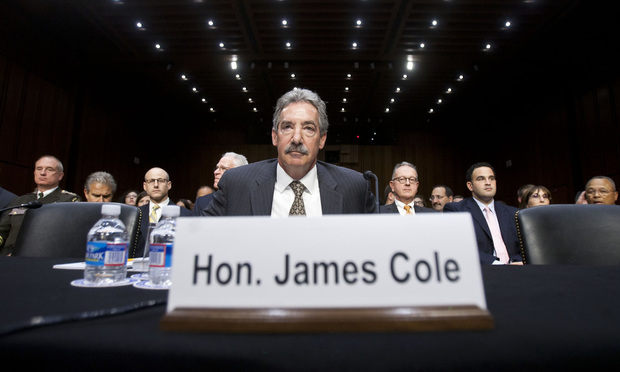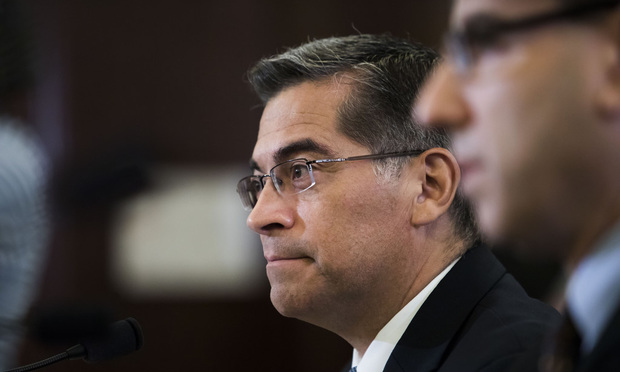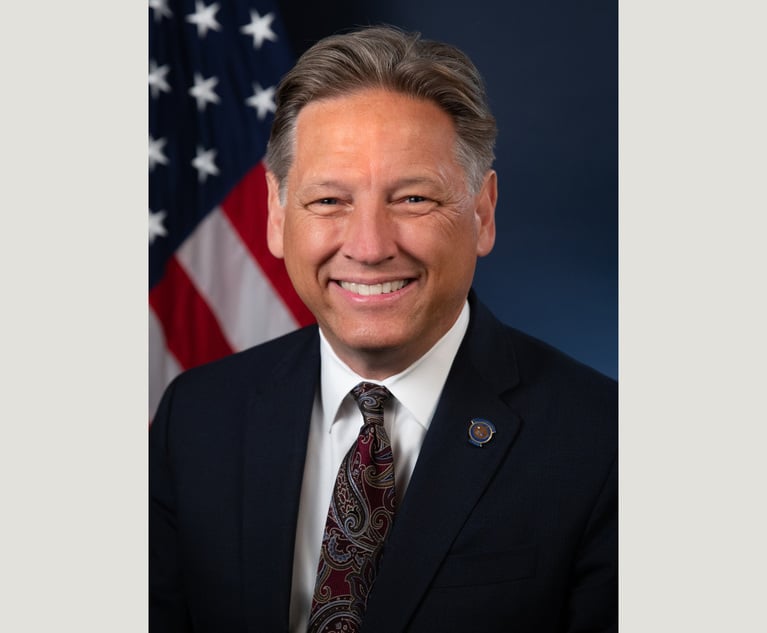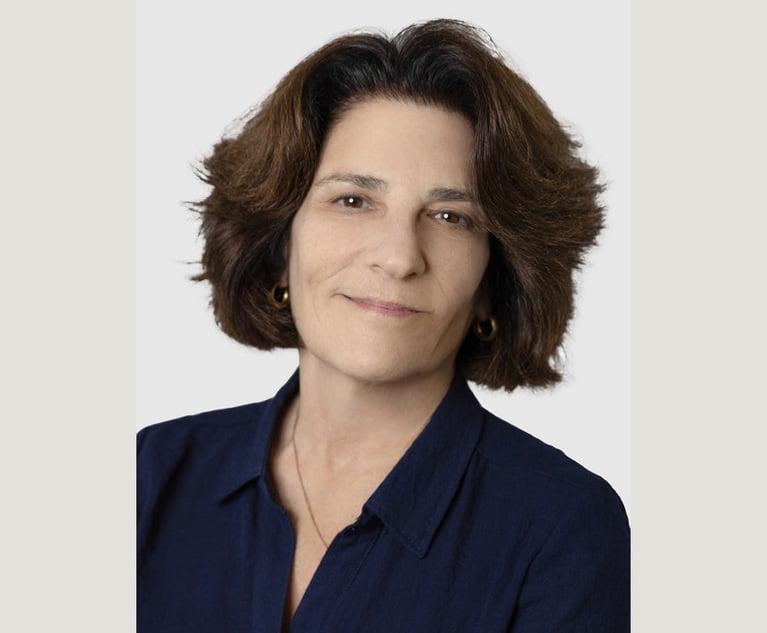James Cole's Marijuana Memo Just Got Revoked. Here's What He Thinks About That.
Cole, now a Sidley Austin partner, said he thought his namesake Justice Department memo outlined "a valid policy and was moving things in the right direction."
January 04, 2018 at 09:13 PM
5 minute read
 James Cole, former deputy attorney general, testifies in 2013. Credit: Diego M. Radzinschi / ALM
James Cole, former deputy attorney general, testifies in 2013. Credit: Diego M. Radzinschi / ALM
The chief architect of Obama-era policies that largely shielded marijuana-legal states from heightened federal scrutiny said the decision by U.S. Attorney General Jeff Sessions to rescind that guidance will create uncertainty in an industry craving stability.
James Cole, now a partner at Sidley Austin in Washington, was the deputy attorney general in 2013 who wrote the guidance—known widely as the Cole memo—that told U.S. attorneys to focus on drug cartels and cross-border trafficking, not marijuana outlets complying with state regulatory schemes.
NY Lawmakers Ask Congress to Pass Marijuana Law Following Sessions Pot Reversal
Sessions revoked that document, calling it “unnecessary” and telling prosecutors to consider a broader, less specific range of “relevant considerations” when deciding whether to charge marijuana crimes.
Cole, in an interview with The Recorder on Thursday, said he thought his namesake memo outlined “a valid policy and was moving things in the right direction.” Twenty-nine states and the District of Columbia now allow medical or recreational use of marijuana or both. Many state regulatory schemes, including California's, focus on compliance with Cole memo tenets.
The Justice Department's rescission of the Cole memo purports to shift more prosecutorial discretion to U.S. attorneys, a move that could lead to starkly different marijuana policies among states and even within states that have multiple federal districts.
In districts where marijuana is legal—such as California's four districts—”there may be a certain level of sophistication and understanding of what their constituents want. That can influence prosecution priorities,” Cole said.
But any predictions are hazy given that President Trump has yet to nominate dozens of U.S. attorney candidates.
The office of McGregor Scott, the U.S. attorney for California's 34-county Eastern District, said in a statement Thursday that prosecutors will evaluate federal marijuana laws “in accordance with our district's federal law enforcement priorities and resources.” The statement continued: “We will continue our long-standing efforts to assess and address the unique threats and challenges facing our district together with our state, local and federal law enforcement partners.”
California leaders lambaste U.S. Justice Department
What happens in the coming months,”depends on whether a prosecutor brings a marijuana case that's outside the former policy,” Cole said. “It will make people nervous.”
Sessions' actions Thursday generated an avalanche of criticism from leaders of marijuana-legal states. Colorado Republican Sen. Cory Gardner said in a tweet that the attorney general had “trampled on the will of the voters in CO and other states.” Gardner threatened to hold up Trump's Justice Department nominees if Sessions does not allow states to make their own determination on the legality of marijuana.
Lori Ajax, the head of California's Bureau of Cannabis Control, said the state is moving forward with its fledgling system of licensing recreational retailers, growers and distributors. California on Jan. 1 launched its recreational rules.
“We expect the federal government to respect the rights of states and the votes of millions of people across America and if they won't, Congress should act,” Ajax said in a statement.
 California Attorney General Xavier Becerra.
California Attorney General Xavier Becerra.California Attorney General Xavier Becerra, who has criticized Sessions's views on marijuana, said his office intends “to vigorously enforce our state's laws and protect our state's interests.” Becerra, like other Democratic attorneys general, has sued the Trump administration over numerous regulatory actions in the past year.
“In California, we decided it was best to regulate, not criminalize, cannabis,” Becerra said. “Unlike others, we embrace, not fear, change.”
Omar Figueroa, a Sonoma County cannabis attorney, said Sessions's actions will foster anxiety throughout the industry.
Investors will be more hesitant to put their money cannabis operations now, he said, and banks—already wary about marijuana—will be even less likely to serve cannabis-related businesses now. Obama-era U.S. Treasury Department guidance for banks that choose to handle marijuana-generated money referenced the Cole memo that Sessions rescinded.
“This disrupts the peace of mind of people in the industry,” Figueroa said. “It's like a rug has been pulled out from underneath them.”
Cole, a 17-year veteran of the Justice Department, said he believes it's time for political action. “This is, I think, an area that really screams out for Congress to bring some clarity,” he said.
Read more:
Q&A: Former DOJ Attorney Dissects AG Sessions' Marijuana Memo
Cannabis-Industry Lawyer Raises Questions After His Bank Terminates Account
Cannabis Law Practices Brace for Impact of Sessions Memo
IRS Power Is Challenged in Marijuana Dispensary's Supreme Court Petition
We Asked 4 Marijuana-Industry Lawyers 4 Questions. Here's What They Said
Charges Against San Diego Cannabis Attorney Alarm Industry Lawyers
This content has been archived. It is available through our partners, LexisNexis® and Bloomberg Law.
To view this content, please continue to their sites.
Not a Lexis Subscriber?
Subscribe Now
Not a Bloomberg Law Subscriber?
Subscribe Now
NOT FOR REPRINT
© 2025 ALM Global, LLC, All Rights Reserved. Request academic re-use from www.copyright.com. All other uses, submit a request to [email protected]. For more information visit Asset & Logo Licensing.
You Might Like
View All
California Supreme Court Vacates Murder Conviction in Infant Abuse Case
5 minute read
Biden commutes sentences for 37 of 40 federal death row inmates, including two convicted of California murders
6 minute readTrending Stories
- 1Legaltech Rundown: Alexi Launches an AI Litigation Tool, Hotshot Announces Private Equity Practice Courses, and More
- 26-48. It’s Comp Time Again: How To Crush Your Comp Memo
- 3'Religious Discrimination'?: 4th Circuit Revives Challenge to Employer Vaccine Mandate
- 4Fight Over Amicus-Funding Disclosure Surfaces in Google Play Appeal
- 5The Power of Student Prior Knowledge in Legal Education
Who Got The Work
Michael G. Bongiorno, Andrew Scott Dulberg and Elizabeth E. Driscoll from Wilmer Cutler Pickering Hale and Dorr have stepped in to represent Symbotic Inc., an A.I.-enabled technology platform that focuses on increasing supply chain efficiency, and other defendants in a pending shareholder derivative lawsuit. The case, filed Oct. 2 in Massachusetts District Court by the Brown Law Firm on behalf of Stephen Austen, accuses certain officers and directors of misleading investors in regard to Symbotic's potential for margin growth by failing to disclose that the company was not equipped to timely deploy its systems or manage expenses through project delays. The case, assigned to U.S. District Judge Nathaniel M. Gorton, is 1:24-cv-12522, Austen v. Cohen et al.
Who Got The Work
Edmund Polubinski and Marie Killmond of Davis Polk & Wardwell have entered appearances for data platform software development company MongoDB and other defendants in a pending shareholder derivative lawsuit. The action, filed Oct. 7 in New York Southern District Court by the Brown Law Firm, accuses the company's directors and/or officers of falsely expressing confidence in the company’s restructuring of its sales incentive plan and downplaying the severity of decreases in its upfront commitments. The case is 1:24-cv-07594, Roy v. Ittycheria et al.
Who Got The Work
Amy O. Bruchs and Kurt F. Ellison of Michael Best & Friedrich have entered appearances for Epic Systems Corp. in a pending employment discrimination lawsuit. The suit was filed Sept. 7 in Wisconsin Western District Court by Levine Eisberner LLC and Siri & Glimstad on behalf of a project manager who claims that he was wrongfully terminated after applying for a religious exemption to the defendant's COVID-19 vaccine mandate. The case, assigned to U.S. Magistrate Judge Anita Marie Boor, is 3:24-cv-00630, Secker, Nathan v. Epic Systems Corporation.
Who Got The Work
David X. Sullivan, Thomas J. Finn and Gregory A. Hall from McCarter & English have entered appearances for Sunrun Installation Services in a pending civil rights lawsuit. The complaint was filed Sept. 4 in Connecticut District Court by attorney Robert M. Berke on behalf of former employee George Edward Steins, who was arrested and charged with employing an unregistered home improvement salesperson. The complaint alleges that had Sunrun informed the Connecticut Department of Consumer Protection that the plaintiff's employment had ended in 2017 and that he no longer held Sunrun's home improvement contractor license, he would not have been hit with charges, which were dismissed in May 2024. The case, assigned to U.S. District Judge Jeffrey A. Meyer, is 3:24-cv-01423, Steins v. Sunrun, Inc. et al.
Who Got The Work
Greenberg Traurig shareholder Joshua L. Raskin has entered an appearance for boohoo.com UK Ltd. in a pending patent infringement lawsuit. The suit, filed Sept. 3 in Texas Eastern District Court by Rozier Hardt McDonough on behalf of Alto Dynamics, asserts five patents related to an online shopping platform. The case, assigned to U.S. District Judge Rodney Gilstrap, is 2:24-cv-00719, Alto Dynamics, LLC v. boohoo.com UK Limited.
Featured Firms
Law Offices of Gary Martin Hays & Associates, P.C.
(470) 294-1674
Law Offices of Mark E. Salomone
(857) 444-6468
Smith & Hassler
(713) 739-1250








